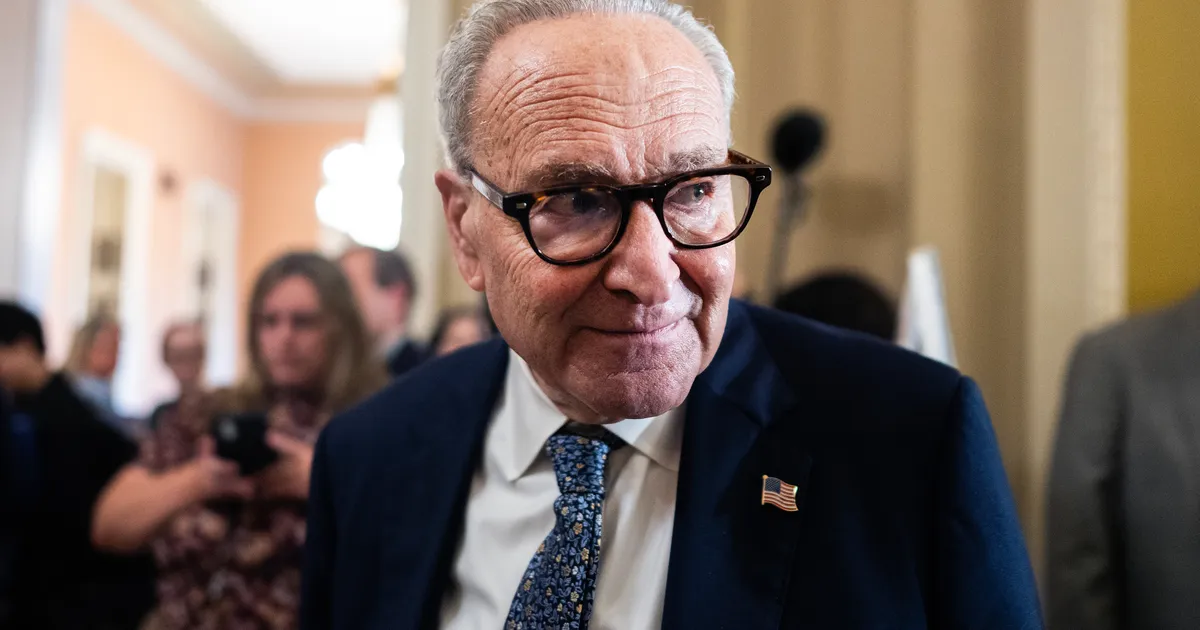Copyright New York Magazine

For the record, Chuck Schumer voted against the motion to proceed on a government-reopening measure that is likely to bring his eight-plus years as Senate democratic leader to an end, probably sooner rather than later. But that doesn’t seem to matter. Democrats angry over the abrupt abandonment of a Senate filibuster that seemed to be working in the party’s favor are blaming Schumer, either because they believe he quietly encouraged the eight Democrats who defected, or because he couldn’t keep them in line. The denunciations of the deal are coming in so fast that it’s hard to keep track of them, many from the very Democrats who will face voters in key 2026 Senate contests, as Politico reports: Across the Senate map, opposition spanned Schumer’s handpicked recruits — who’ve been largely silent about the shutdown — to the insurgents who’ve called for his ouster. “This is a bad deal for Ohioans,” former Sen. Sherrod Brown said in a statement. Maine Gov. Janet Mills panned “the promise of a vote [on the subsidies] that won’t go anywhere.” Former North Carolina Gov. Roy Cooper — Democrats’ best chance for flipping a Senate seat and the last major candidate to weigh in on the deal — said in a statement that “any deal that lets health care costs continue to skyrocket is unacceptable. … Minnesota Lt. Gov. Peggy Flanagan said in a video, “we deserve so much more than this bullshit. …” “If people believe this is a ‘deal,’ I have a bridge to sell you,” said Flanagan’s rival, Rep. Angie Craig (D-Minn.), adding that she’s a “no” when the measure comes up for a vote in the House. “I’m not going to put 24 million Americans at risk of losing their health care.” If any current or prospective House Democrats are feeling more tolerant toward the deal, they’re being quiet about it. And even though House Democratic Leader Hakeem Jeffries appeared to deflect blame from Schumer for the filibuster collapsing, some of his troops are vocally dissenting from any absolution: And it’s clear that for some, this is a three-strikes-and-you’re-out situation. Schumer’s public abandonment of an earlier shutdown confrontation in March enraged many pugilistic Democrats. And then his refusal to endorse the Democratic nominee for mayor of his own city was a deal-breaker for others. And even those who don’t specifically blame him for the current situation may well share concerns over Schumer’s cringe-worthy messaging style, his habitual elevation of tactics over strategy, and his embodiment of Democratic gerontocracy. But what probably seals Schumer’s fate is simply his expendability. Less than a week ago, Democrats were exited and united following a 2025 election sweep in which every party faction did its part. Now pundits and Republicans are the ones excited as Democrats appear on the brink of yet another struggle for their soul. None of the eight Senate Democrats who voted to reopen the government are going to be on the ballot next year, so there will be no immediate opportunity to “primary” any of them. Chuck Schumer’s is the obviously available head to be placed on a pike if the party needs to protest the latest “cave” and then move on. Thanks to the Senate’s ancient traditions of self-importance, all the criticism of Schumer from outside the U.S. Senate only matters if his colleagues join in. He might be encouraged by them to quietly step aside or announce a time-certain retirement date. If it gets to the point where Democratic senators are openly calling for his defenestration, it will be an indication that he’s stubbornly hanging on to power, which will make the problems he represents even worse. He’s had a reasonably long tenure as leader and got to run the Senate for two quite productive years. But it’s probably time for him to follow his old frenemy Mitch McConnell into a back bench, if not retirement.



